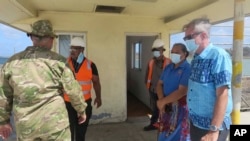Efforts to aid the tens of thousands of people affected by Tonga’s disastrous volcanic eruption are beginning to gather momentum, with the first arrivals of aid by plane and boat from New Zealand and Australia.
The full scope of damage and needs is still unknown. However, humanitarian agencies say about 87 percent of the South Pacific island’s 100,000 people have been affected by the volcanic ash and tsunami triggered by the underwater eruption.
Assessments of the damage from government and international sources are slowly trickling in. They find the biggest priorities to be that of restoring telephone and internet links, as well as the provision of safe drinking water for about half of the population.
The World Food Program warns of potential food shortages because all agricultural sectors have been badly affected, from crops to livestock and fisheries. WFP spokesman Tomson Phiri says initial estimates show up to 12,000 agricultural families have been affected.
“Roughly 60 to 70 percent of livestock-rearing families are estimated to have been affected," said Phiri. "Given the enormity of the eruption, it is likely most families could do nothing to protect or save their livestock from perishing and for those that survived, there may be very little grazing pasture and uncontaminated water supplies left.”
While a large-scale aid operation is finally getting underway, the United Nations warns the volcano is still active and Tonga is not yet out of danger.
Another concern is that Tonga, which is free of COVID-19, remain so and not have the coronavirus enter the country during the delivery of aid.
The spokesman for the U.N. Office for the Coordination of Humanitarian Affairs, Jens Laerke, says the first rule of humanitarian action is to do no harm. He says very strict protocols are in place to prevent that from happening. He says all agencies will abide by what he calls a no-contact delivery.
“The pilot staying in the cockpit. A grand crew of local folks unloading the plane and the pilots taking off without exiting the plane," said Laerke. "It could also be ships going to port and being offloaded by cranes. So, also so that the ship crew do not actually get into the island.”
The World Health Organization says all medical and health care facilities on the island are operational. It notes the air is toxic because of the ash and dust raised by the volcanic eruption and says it is urging people on the island to stay indoors and wear masks when they venture out.




